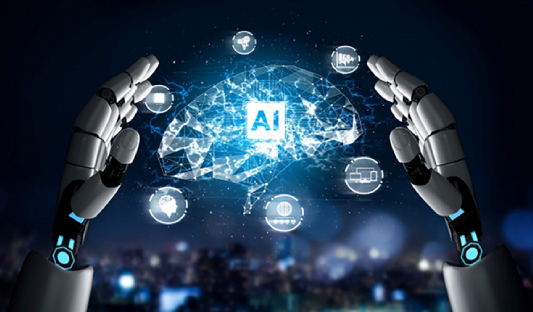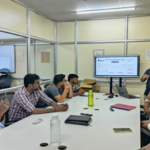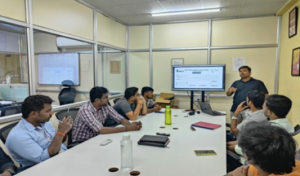
How AI is Shaping the Future of IT At Fedrus!
In today’s fast-paced world, technology is evolving faster than ever, with Artificial Intelligence (AI) leading the charge. While AI is making waves across various industries, its impact on Information Technology (IT) is particularly profound. From automating routine tasks to enhancing cybersecurity and providing smarter insights, AI is becoming an essential part of the IT landscape.
So, how is AI shaping the future of IT, and where does Fedrus Engineers fit into this transformation? Let’s explore the key ways AI is revolutionizing IT and how we’re contributing to this shift
1. Automating Routine Tasks
One of AI’s most significant impacts on IT is its ability to automate repetitive and mundane tasks. IT professionals spend a significant amount of time managing routine processes like software updates, troubleshooting, and data backups. AI-powered tools can handle these tasks with minimal human intervention, freeing up valuable time for IT teams to focus on more strategic initiatives.
For example, AI-driven chatbots are increasingly used for customer support, troubleshooting common issues, and resolving user queries. This not only improves efficiency but also ensures that support is available 24/7, reducing downtime and enhancing customer satisfaction.
2. Enhancing Cybersecurity
As cyber threats become more sophisticated, traditional security methods are no longer enough to protect sensitive data and systems. AI is revolutionizing the way we approach cybersecurity by enabling real-time threat detection and response.
AI can analyze vast amounts of data, identify patterns, and predict potential vulnerabilities or attacks before they happen. Machine learning algorithms can continuously adapt to new threats, providing proactive security measures. This shift from reactive to proactive security is essential in an era where cyberattacks are becoming more complex and frequent.
For IT professionals, AI’s role in cybersecurity is a game-changer, offering an extra layer of protection and reducing the risk of breaches or data loss.
3. Predictive Analytics for IT Operations
AI-driven predictive analytics help IT teams anticipate issues before they occur. By analyzing historical data, AI can predict when hardware might fail or when systems need maintenance, reducing downtime and improving efficiency.
4. Smarter Data Management
As data grows, AI makes it easier to manage and analyze. It quickly processes vast amounts of data, uncovering insights that would take humans much longer to identify. For IT teams, this means more powerful tools for better decision-making and business growth.
5. Optimizing Cloud Computing
AI is also playing a pivotal role in the future of cloud computing. Cloud services are already widely used by businesses for data storage, software deployment, and more, but AI is taking these services to the next level.
AI-powered cloud solutions can optimize resource allocation, automate load balancing, and improve system performance. Additionally, AI is improving cloud security by detecting vulnerabilities and ensuring data privacy.
For businesses, the combination of AI and cloud computing provides more flexible, scalable, and cost-effective IT solutions, while for IT teams, it streamlines cloud management and enhances operational efficiency.
6. Personalizing User Experiences
AI tailors user experiences based on individual behavior and preferences. For IT systems, this means smarter, more intuitive applications. Personalization helps businesses engage users and allows IT teams to build more adaptive systems.
7. AI-Driven IT Support
AI is also revolutionizing the way IT support is delivered. Traditional IT support often involves long wait times, manual troubleshooting, and repetitive tasks. AI is changing that by offering intelligent, automated solutions that can resolve issues quickly and efficiently.
AI-driven IT support tools, like virtual assistants, can help users resolve common IT issues without the need for human intervention. By leveraging natural language processing (NLP) and machine learning, these AI systems can understand user queries, analyze issues, and provide immediate solutions—often without involving an IT professional at all.
This shift not only enhances the speed and efficiency of IT support but also helps businesses save costs and improve overall satisfaction.
Conclusion: Embracing the Future with AI in IT
AI is undeniably transforming the IT landscape, offering unprecedented opportunities for automation, security, analytics, and personalization. From improving IT operations to revolutionizing cloud computing and cybersecurity, AI is poised to redefine how IT systems are managed and utilized.
For businesses, adopting AI in IT means more efficient, scalable, and intelligent solutions that can enhance productivity, reduce costs, and drive growth. For IT professionals, AI presents new challenges and opportunities to learn, innovate, and improve systems.
As we look toward the future, it’s clear that AI will be at the forefront of IT innovation, paving the way for smarter, more efficient technologies that will shape the way we work and interact with digital systems for years to come. Embracing AI today is not just an option; it’s essential for staying ahead in the rapidly evolving world of IT.




No comment yet, add your voice below!